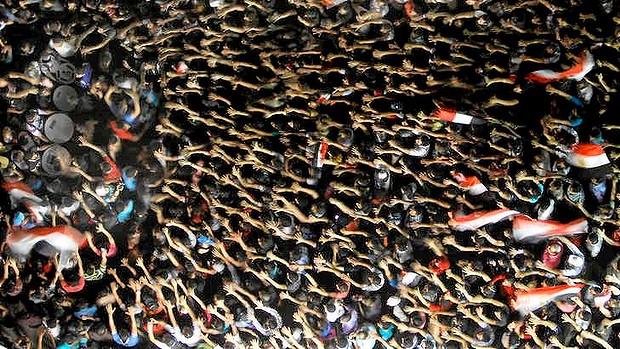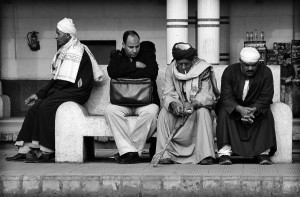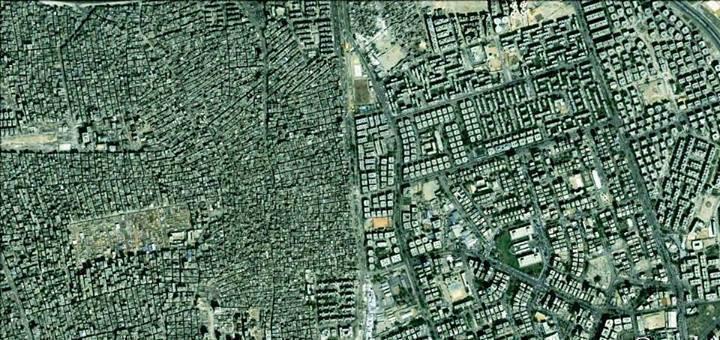
Did our parents make the mistake of their lives for bringing us up in this country? Or has globalization made us so unaware of the un-globalized world we have grown up in? The truth is that Egypt is not so globalized after all. To think that we are common citizens of this nation would be the biggest deception anyone could fall for – a dangerous deception at that.
This is where every feeling of disorientation any of us ever felt originated – in the very nature of “common Egyptian society”. Reality had to hit us someday, hard in the face. We really do not own this country, are not the real citizens of Egypt, though we hold its passport.
The following words might hurt many of you, but bear with me because I mean none of it personally and am only shedding a piece of reality. The class struggle in Egypt has become no longer a class struggle, rather a civilization struggle. Whilst one civilization dreams of a liberated society where right and wrong are only personal reflections, the other civilization is actually strong-arming the dream.
It has become so difficult to do even the smallest things in this society, to take your girl for a walk by the Nile, or just a walk anywhere, really. While the common man can go out with his girl for a public felucca ride, can any of you? Well, unless you book the whole boat for yourself, you’d probably be harassed to the ground – even if not sexually, someone would throw a word here or there.

While you probably do not notice this flaw in society, there’s something about the bourgeoisie of this country that make us look physically different than the common man. Is it the clothes? The hair? The makeup? Or just the vibe we emit?
Do I really have to frown at every single person on the street in order to be Egyptian? Do I have to blast my ghetto, depressing “Sha3by” song and cry along with it to be considered Egyptian? I’m guessing the common man has finally found his stereotype of the bourgeoisie society. Or is it the opposite?
Am I stereotyping the common man in this description right now? You know there’s a problem when both classes choose to judge one another with no basis whatsoever. Is it in the way we were raised? To reject anything that is different, even though it might be similar.
Do you hate all Israelis because they’re not Egyptian like you? Do you resent all the poor just because they are not rich like you? Well let me tell you something, Western societies have more in common with Egyptian bourgeois than do the bourgeois with the common Egyptians.
I have to admit, I’m facing a strong challenge with this identity crisis – I cannot identify with being Egyptian, but I do have the passport and carry the nationality. The conflicting beliefs are sometimes overwhelming, “sometimes” being all the time when I’m on the street, away from Egypt’s intertwined, miniature social circles.

Maybe I’ve never seen it in person, but I sometimes get this feeling of nostalgia for Egypt in the ’80s, or before, when we actually saw women wearing skirts, beer served in cafes and a liberated society willing to swallow differences and enjoy similarities.
I don’t think we can really blame ourselves – after all, we are all victims of the world we live in. Each one of us has experienced something tragic, been hurt, been happy or been broken. We tend to think of ourselves as unique, as if no one else has even experienced what we have, but the reality is that all people share common feelings, whether we admit it or not.
The rich love, so do the poor. The rich hurt, so do the poor. The rich get hurt by others and so do the poor. The rich drink on weekends, so do the poor on their weddings.
Why then do we reject other classes of society even though they live the same way we live? We just choose to look at what they do differently, rather than the essence of what they do.
Instead of judging the breakfast they eat, we should ask why they’re eating it. Instead of judging the way they drive, we should ask why they’re driving like that. Instead of judging the beggar on the street nagging for a coin, we should ask ourselves why (s)he’s asking for it.
We all share humanity in itself. Whether we do it in fancy, seven star hotel rooms or on the street. Whether we do it in fancy suits and dresses or just torn-up shirts and pants we got from a charity organization. People live regardless.
I just wish we could go back to looking at our similarities, look back at our humanity, and let go of all the differences, of class, of education, of civilization, of everything.
After all, we are all inhabitants of the planet – call your countries whatever, call your classes whatever, call your political parties whatever, and I will call myself Human, inhabitant of the Earth.
WE SAID THIS: Don’t miss Farah Osman’s powerful piece on sexual assault and victim blaming in Egypt.


